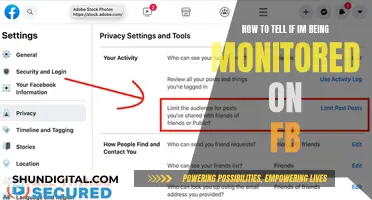
If you want to hook up your Rokit monitors to an interface, you'll need to make sure you have the right cables. The Rokit 5s have either TRS (1/4 inch and balanced) or XLR. You will need an audio interface, and a popular option is the Scarlett range, and the price all depends on how many ins and outs you want. The 2i2 is probably the minimum to go for as it allows for a little more than the cheapest option. If you're just looking for a cheap solution you can normally get decent interfaces on eBay for sub £50.
| Characteristics | Values |
|---|---|
| Connection type | Balanced or unbalanced |
| Cable type | TRS, TS, XLR, RCA, 3.5mm jack |
| Cable length | 6' may be too short, 10' recommended |
| Audio interface | Recommended for sound quality, volume control, headphone socket, analogue to digital conversion |
What You'll Learn

Using a 3.5mm jack to 2x XLR male cable
To connect your KRK Rokit monitors to your laptop, you will need a 3.5mm jack to 2x XLR male cable. This cable will allow you to connect your monitors to your laptop's headphone jack.
When purchasing this cable, you may come across the terms "balanced" and "unbalanced". Balanced cables are less susceptible to noise interference and distortion, so they are recommended for audio equipment. If you are connecting your KRK Rokit monitors to a laptop without an audio interface, you will need an unbalanced cable. If you are connecting your monitors to an audio interface, you will need a balanced cable.
It is important to note that you should always ensure your monitors are switched off when plugging or unplugging cables to avoid hearing harsh loud sounds and potentially damaging your monitors.
Additionally, if the cable is not long enough, you can easily extend it using a regular microphone cable. You will need two cables, one for each speaker.
Enabling G-Sync on Your ASUS Monitor: A Step-by-Step Guide
You may want to see also

Using a 1/4 TRS cable
Using a 1/4" TRS cable is a simple and high-quality option for connecting studio monitors to an audio interface. This type of cable provides a balanced connection, resulting in better audio signal transmission over longer distances.
To set up your Rokit monitors using 1/4" TRS cables, follow these steps:
- Ensure that your monitors and interface are turned off before making any connections.
- Connect one end of the 1/4" TRS cable to the left output on your audio interface.
- Connect the other end of the same cable to the left input on your left Rokit monitor.
- Repeat this process for the right monitor, using a separate 1/4" TRS cable. Connect the right output of your interface to the right input of the right monitor.
- Once all connections are secure, you can power on your monitors and interface.
- Adjust the volume levels accordingly, starting at around 50% on your monitors and fine-tuning with the output volume knob on your interface.
Using 1/4" TRS cables provides a straightforward and reliable connection between your Rokit monitors and audio interface, ensuring optimal sound quality for your setup.
Monitoring Gas and Electricity Usage: Smart Meter Revolution
You may want to see also

Using a 1/4 TRS to XLR cable
Using a 1/4" TRS to XLR cable is a great way to connect your Rokit monitors to an interface, especially if your monitors only have XLR inputs. This type of cable provides a balanced connection, which means it delivers better audio quality over longer cable runs and helps to cancel out any noise or interference.
When choosing a 1/4" TRS to XLR cable, look for one with high-quality connectors, such as gold-plated contacts, and a durable jacket to ensure a reliable connection. You may also want to opt for a cable with oxygen-free copper conductors, as this can further enhance signal clarity and reduce noise. Additionally, consider the length of the cable and choose one that is long enough to comfortably reach your setup.
- Disino 1/4" TRS to XLR Male Balanced Signal Interconnect Cable: This cable features gold-plated connections, a high-strength aluminium alloy die-cast housing, and a 20 AWG oxygen-free copper core for pristine sound. It is designed to minimise signal interference and provide maximum cancellation of hum and noise.
- Mogami Gold 1/4" TRS to XLR Male Patch Cable: This cable offers superior construction and sound quality, with gold contact 1/4" TRS and XLR male connectors, and a Neglex Studio Quad cable.
- Hosa Pro Balanced Interconnect Cable: This cable features REAN 1/4" TRS male to XLR male connectors and is designed for reliable performance.
- Pro Co Excellines Balanced Patch Cable: This cable provides a cost-effective option with XLR male to 1/4" TRS male connectors and is available in various lengths.
Cleaning Your LCD Monitor: Step-by-Step Guide
You may want to see also

Using a 1/4 TS cable
To connect your Rokit monitors to an interface using a 1/4 TS cable, follow these steps:
- Ensure that your Rokit monitors and interface are turned off before making any connections.
- Connect the 1/4 TS cable to the output on your interface. Typically, the output will be a 1/4" jack.
- Connect the other end of the 1/4 TS cable to the input on your Rokit monitor. The input on the monitor is usually a 1/4" jack as well.
- Repeat the process for the second monitor if you have a pair of Rokit monitors.
- Once the connections are secure, you can turn on your monitors and interface. Adjust the volume on your interface to a comfortable level, usually around 50%.
It is important to note that using a 1/4 TS cable may result in a lower sound quality compared to using a balanced cable like a TRS or XLR cable. Additionally, ensure that you are careful with the placement of the cables to minimise potential interference from power sources and computer equipment.
Connecting Three Monitors to Your MacBook Air: The Ultimate Guide
You may want to see also

Using a 1/4 TS to RCA cable
If you're looking to connect your Rokit monitors to an interface using a 1/4 TS to RCA cable, you're in luck! This is a valid method to connect your monitors, although it is an unbalanced connection. This means that the cable uses one of its wires to carry the signal and act as the ground wire. This makes the cable cheaper and easier to assemble but also more susceptible to interference from other electronics.
To avoid interference, keep your cables under 25 feet in length and ensure they are not placed near power bars or computer equipment. You can purchase these cables in a variety of lengths from companies such as Hosa, Pro Co, Roland, and Mogami.
OpenLM's Actual Usage Time: Monitoring and Management Strategies
You may want to see also
Frequently asked questions
A pair of 1/4" balanced TRS cables is the simplest, highest-quality option for connecting studio monitors to an audio interface.
You will need a 3.5mm jack-to-2x XLR male cable.
An audio interface is a sound card that is vital for recording. It offers higher-quality performance and more possibilities, such as professional connection options.
Balanced cables are less susceptible to noise and interference, while unbalanced cables are more prone to interference and have a shorter maximum cable run.







